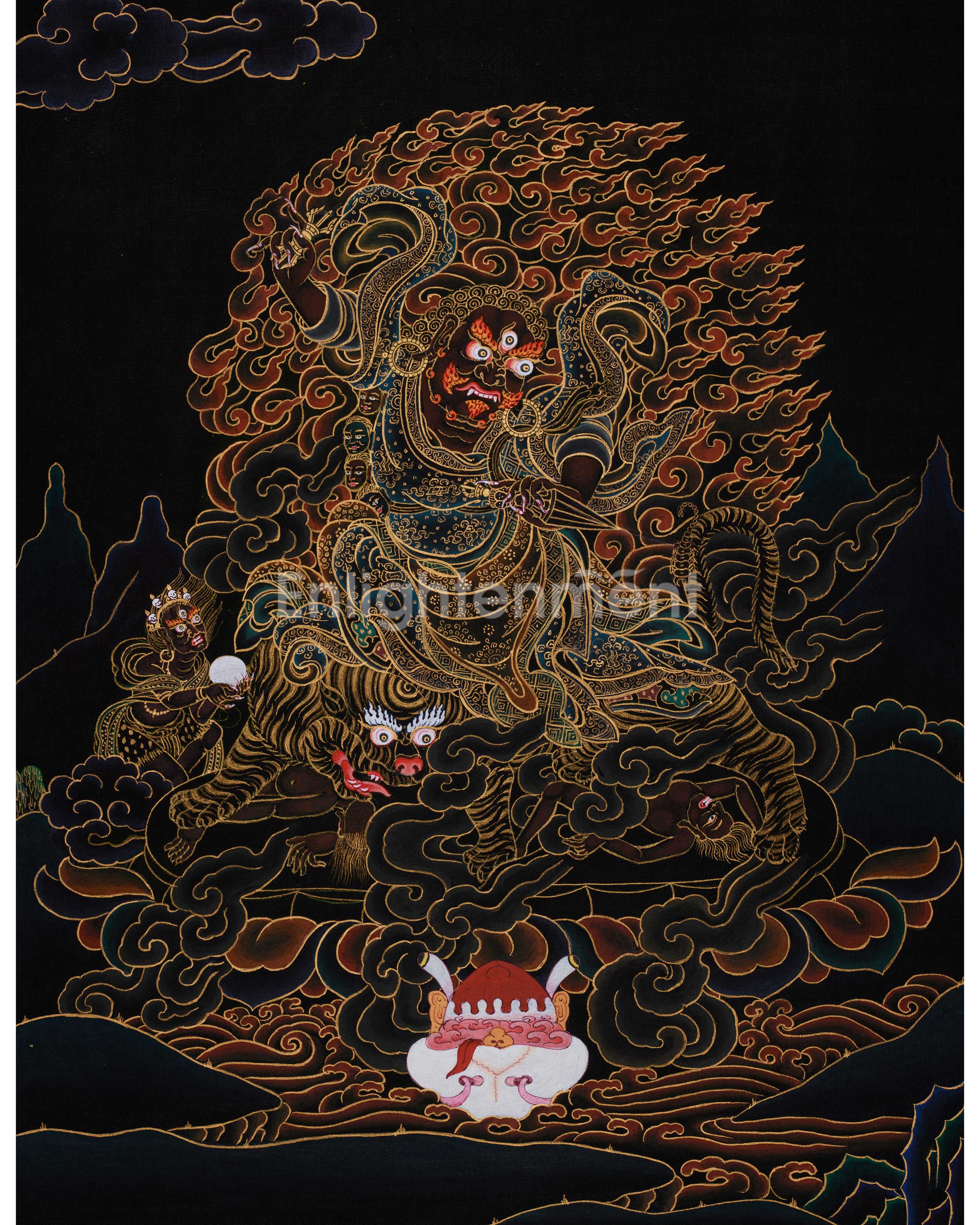Guru Rinpoche
1 product
Showing 1 - 1 of 1 product
Guru Rinpoche Thangka | Padmasambhava Thangka Collection
Guru Rinpoche, or Padmasambhava, is regarded as the Second Buddha in Tibetan Buddhism. He is credited with introducing Vajrayana teachings in Tibet and subduing negative forces to establish the Dharma. His presence is central in Nyingma and Dzogchen lineages, making his thangka a powerful spiritual symbol for protection, transformation, and realization.
What makes this Guru Rinpoche Thangka Collection special?
This collection features an exclusive selection of hand-painted Guru Rinpoche Thangkas, also known as Padmasambhava Thangkas, created by master artists from our in-house Enlightenment Studio. Crafted on traditional handmade canvas using natural stone pigments and 24K gold, these sacred artworks represent the revered tantric master in various iconographic forms. Each piece is a meditation tool, a sacred gift, and a spiritual guide for practitioners of Vajrayana Buddhism.
What iconographic forms of Guru Rinpoche are included in the collection?
Our Guru Rinpoche Thangka Collection includes rare and significant iconographic depictions, such as:
-
Padmasambhava in Royal Robes – holding the vajra and skull cup, seated on a lotus with lotus hat and staff (khatvanga).
Guru Rinpoche is commonly shown seated on a lotus seat, symbolizing his miraculous birth. He wears the three robes of a monk, the vajra crown adorned with five skulls, and holds three powerful symbols:
-
Vajra (dorje) in his right hand, representing indestructible compassion and method.
-
Skull cup (kapala) in his left hand, containing the vase of immortality.
-
Trident (khatvanga) resting on his shoulder, symbolizing his consort Yeshe Tsogyal and the inseparability of bliss and emptiness.
His expression reflects loving compassion combined with uncompromising wisdom, making these paintings deeply suitable for meditative visualization and tantric practice.
-
-
Guru Rinpoche in Eight Manifestations (Guru Tsen Gye) – including Guru Dorje Drolö (fierce), Guru Pema Gyalpo (royal), and Guru Nyima Özer (radiant).
-
Guru Nangsi Zilnon – a wrathful form conquering obscurations.
-
Guru Rinpoche in Pureland Zangdok Palri – depicting his celestial abode with a peaceful entourage.
-
Guru Rinpoche with Mandarava and Yeshe Tsogyal – the two main consorts and accomplished dakinis.
- Eight Manifestion of Guru Rinpoche
- 25 Disciples of Guru
Each thangka adheres to authentic iconographic proportions, maintaining traditional Tibetan thangka symbolism for clarity and depth in practice.
Can I buy Guru Rinpoche Thangkas online?
Yes, each Guru Rinpoche thangka is available for direct purchase online with worldwide free shipping. Whether you're searching for a Padmasambhava thangka for meditation, a sacred Tibetan art gift, or a high-quality thangka for consecration, this collection has a range to suit your spiritual needs.
Can I use these thangkas for rituals, empowerment, or daily practice?
Absolutely. These thangkas are designed according to authentic iconographic texts and lineage standards, making them fully appropriate for:
-
Vajrayana visualization and sadhana
-
Retreat environments
-
Sacred offerings
-
Empowerments and personal altar spaces
Many practitioners also choose these Padmasambhava thangkas as sacred gifts for teachers or Dharma centers.
Start Your Journey with Guru Rinpoche Today
Browse our complete Padmasambhava Thangka Collection to find a sacred painting that resonates with your practice. Each thangka is a one-of-a-kind Buddhist artwork crafted with devotion and precision, ready to illuminate your shrine or meditation room.

